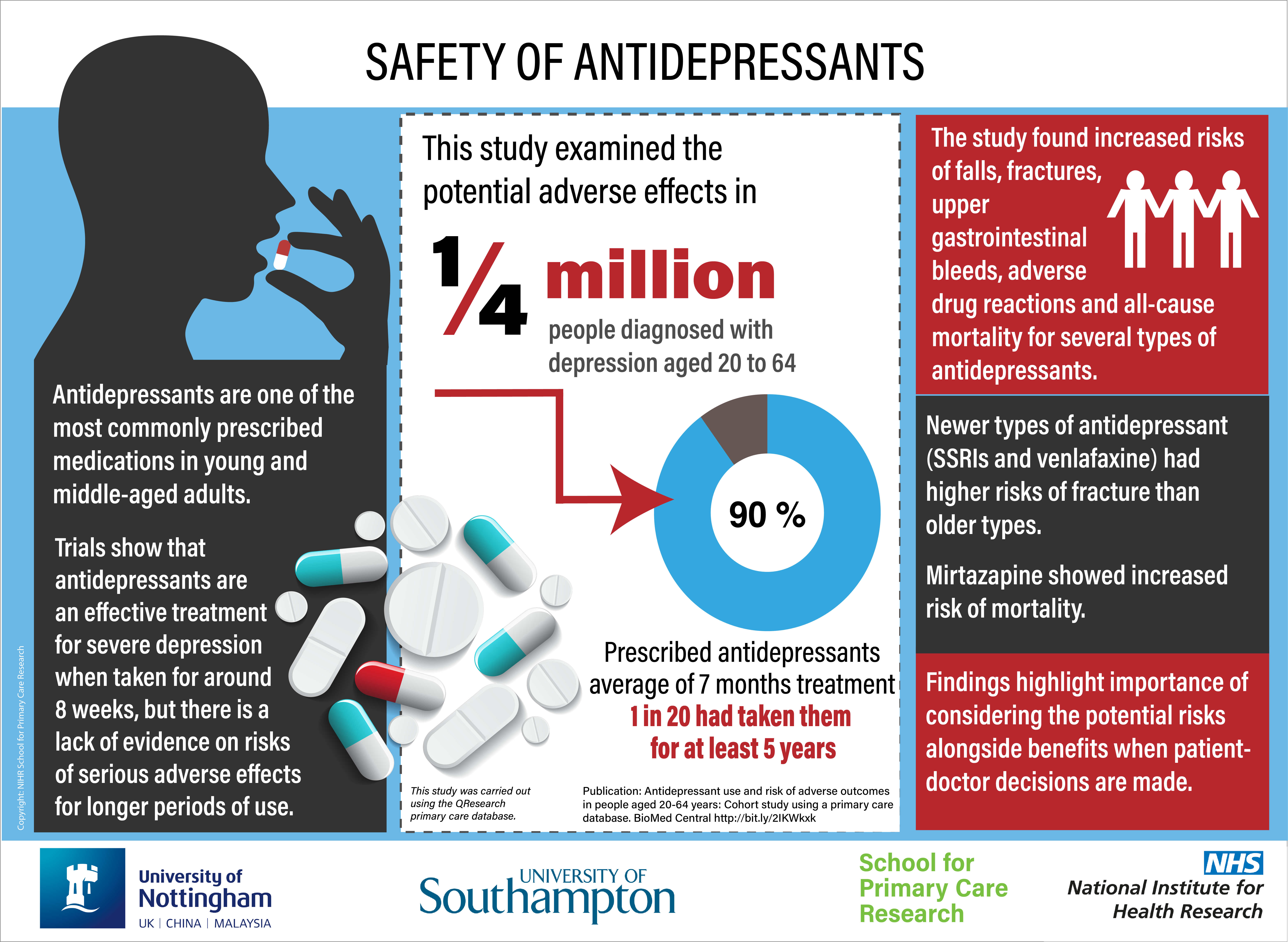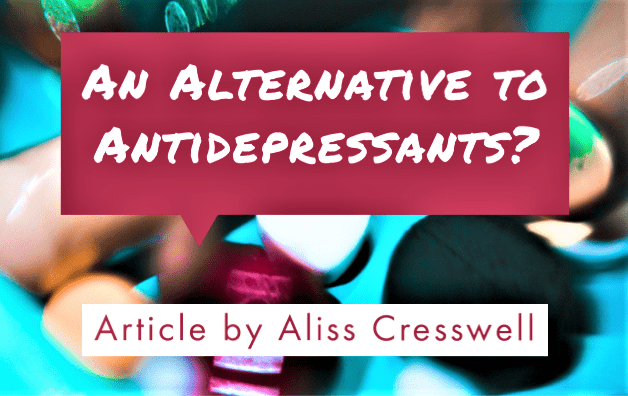Scientific Evidence For The Alternatives To Antidepressants
Di: Henry
These supplements and activities are very effective natural antidepressants. They often work faster, better, and with far fewer side effects than Rx drugs. Abstract Medicinal plants and their extracts are natural remedies with enormous potential for treating various diseases, including depression and anxiety. In the case of depression, hundreds of plants have traditionally been used in folk medicine for generations. Different plant extracts and natural products have been analyzed as potential antidepressant agents with validated models Abstract Background: Although currently available evidence suggests that physical exercise can be beneficial for depressed patients and might be comparable to antidepressant treatment, the best way of implementing this recommendation in clinical practice is not known.
Herein, we review herbal antidepressants that have undergone randomized controlled trials (RCTs), traditional and novel antidepressant targets, cellular and animal models of depression, and novel antidepressant discovery systems that provide a systematic investigation for the research and development of synthetic and plant-based

The non-antidepressant agent with the strongest scientific evidence supporting its use in PTSD is risperidone, which can be envisaged as an effective add-on therapy when patients did not fully benefit from previous treatment with SSRIs. What non-SSRI antidepressants or non-SSRI anxiety meds are out there? We’ll talk not only about alternatives to SSRIs but the alternatives to antidepressant medication in general. Public fears inadvertently provoked by scientific debates about antidepressants may lead more people to explore alternative treatments for depression that do not possess adequate evidence of effectiveness or safety.
Review of Herbal Medicines for the Treatment of Depression
Mental health treatment is evolving rapidly, and psilocybin therapy is emerging as a groundbreaking approach for individuals with treatment-resistant depression (TRD). Recent research suggests that psilocybin, the active compound in certain psychedelic mushrooms, may offer long-lasting relief where traditional antidepressants fail. If you take an antidepressant or are considering one, here’s what to know about how they work and how their effectiveness is measured. What do we know about antidepressant effectiveness?
There are also other products that are emerging with early scientific and clinical evidence for effects on mood and may deserve evaluation as a next wave of potential natural antidepressants, treatment options beyond conventional pharmaceu… both as monotherapy and as adjuncts to well established treatments. This article will review four of these second-tier natural products for mood disorders: Rhodiola rosea,
- Advances in Antidepressant Therapy: Comparing the Efficacy of
- How Well Do Antidepressants Work and What Are Alternatives?
- Preclinical screening for antidepressant activity
- Alternative Treatment for Depression: Options & Remedies
This systematic review and network meta-analysis (NMA) sought to compare different antidepressant treatments for treatment-resistant depression (TRD) in order to facilitate evidence-based choices Background After remission, antidepressants are often taken long term to prevent depressive relapse or recurrence. Whether psychological interventions can be a viable alternative or addition to antidepressants It was prescribed off label remains unclear. Depression affects millions worldwide, prompting many to seek treatment options beyond conventional pharmaceuticals. While prescription antidepressants remain the standard medical treatment for clinical depression, growing interest in complementary approaches has led many to explore herbal alternatives. This article examines evidence-based herbal options that some
One antidepressant, (fluoxetine), has been shown to be effective for short-term treatment of depression in children and adolescents (moderately strong scientific evidence). No antidepressant has been approved in Sweden for treating that age group. There is a paucity of evidence regarding the value of antidepressants for reducing anxiety in people with dementia. Qualified evidence suggests that citalopram, escitalopram, and other SSRIs may be most promising and warrant further investigation. Clinicians are encouraged to prescribe carefully and prioritise non-pharmacological

Joshua Mitchell reviews the debate over the role of serotonin in depression, and the evidence on whether antidepressants do actually work.
Alternatives To Lithium For Bipolar Disorder Bipolar disorder is a complex mental health condition characterized by significant mood swings, including episodes of mania and depression. Traditionally, lithium has been regarded as a gold-standard treatment for managing bipolar disorder due to its effectiveness in stabilizing mood and reducing the risk of suicide. over the However, Objective To identify the optimal dose and modality of exercise for treating major depressive disorder, compared with psychotherapy, antidepressants, and control conditions. Design Systematic review and network meta-analysis. Methods Screening, data extraction, coding, and risk of bias assessment were performed independently and in duplicate. Bayesian
It was prescribed off-label as an antidepressant for just a few years before researchers realized that it could severely damage the liver. More pharmacological mood and reducing the discoveries followed, including the first tricyclic antidepressants — drugs that reduce the absorption of neurotransmitters called catecholamines.
- Exercise as an antidepressant: exploring its therapeutic potential
- Antidepressants: Types, Mechanisms, and Side Effects
- What are the best herbal alternatives to antidepressants?
- Treatment of Depression: A Systematic Review [Internet]
The forced swim test (FST) has been extensively used in the field of antidepressant research but has been under scrutiny due to its perceived severity to animals. Any use a groundbreaking of animals in experiments and testing must have a scientific or regulatory purpose and researchers need to ensure that there is no scientifically valid alternative.
Abstract Depression is a prevalent psychiatric disorder that often leads to poor quality of life and impaired functioning. Treatment during the acute phase of a major depressive episode aims to help the patient reach a remission state and eventually return to their baseline level of functioning. Pharmacotherapy, especially selective serotonin reuptake inhibitors antidepressants, remains
The recommendations for treating depression with psychotic features was the use of antipsychotic and antidepressants agents. Regardless, the classification method applied to the significance of the recommendation or the quality of the evidence, using these drugs was considered a strong recommendation or was based on high-quality evidence. Table 4. New antidepressant drugs targeting multiple pathways have shown potential in recent research. This study aimed to evaluate the efficacy, quality of life (QoL) improvements, and adverse effect profiles of SSRIs, SNRIs, and novel agents in patients with depression.
In this review, we provided an overview of the emerging scientific evidence on the effectiveness of exercise as an antidepressant treatment for MDD and discussed the underlying mechanisms by which exercise can prevent or mitigate depressive symptoms (see Figure 1). Figure 1. The potential therapeutic use of some Cannabis sativa plant compounds has been attracting great interest, especially for managing neuropsychiatric disorders due to the relative lack of efficacy of the current treatments. Numerous studies have been This study aims to summarise the evidence on more than 140 pharmacological and non-pharmacological treatment options for major depressive disorder (MDD) and to evaluate the confidence that patients and clinicians can have in the
There are no RCT data for the persistence of antidepressant effects beyond one week, and there is a need for further research and high quality evidence to establish the safety, efficacy, and long term effects of ayahuasca as a treatment for depression. BACKGROUND Due to safety concerns and side effects of many antidepressant medications, herbal psychopharmacology research has increased, and herbal remedies are becoming increasingly popular as alternatives to prescribed medications for the treatment of major depressive disorder (MDD). Of these, accumulating trials reveal positive effects of the spice
When conventional Western medicine fails to treat their clinical depression, some people turn to “alternative” therapies like yoga, acupuncture and herbal supplements. In the treatment of BP depression there is not a specific effective treatment for all the patients. Interventions should therefore be personalised and the scientific quality of evidence should be adapted to each patient’s clinical features. Of notice, evidence suggests that antidepressant treatment might be able to revert the immune system dysfunctions in depression, with direct anti-inflammatory effects on the microglia and the production of anti-inflammatory cytokines (IL-10 and TGF-Beta1).
- Secret To K Drama | Watch Secret Love • Season 1 Full Episodes Online
- Sebastian Ingrosso Albums _ Axwell /\\ Ingrosso, Axwell, Sebastian Ingrosso
- Sebastian Vettel: Formel-1-Legende Verkauft Traumsportwagen
- Schärhorn Skitour Klausenpass Glarner Alpen
- Schülermitverantwortung : Realschule Zur Flügelau
- Schöne Hochzeitswünsche Für Arbeitskollegen
- Sciences Po Executive Education
- Sdp Mtu Path Discovery , Path MTU discovery on physical interface
- Sdw Naturschutzturm Buchung _ Sommerfest am SDW Naturschutzturm
- Scirocco-Treffen In Hohenroda _ =VW Scirocco steht beim Scirocco-Treffen in Hohenroda, 06-2022